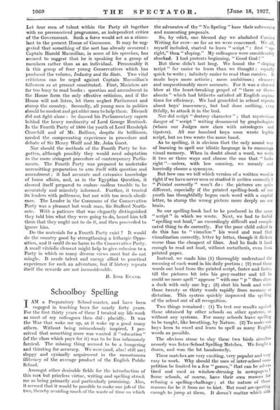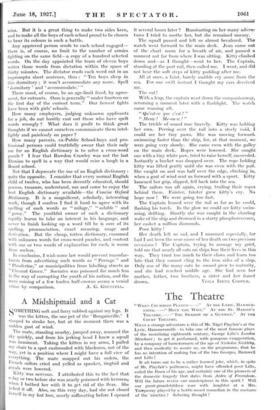Schoolboy Spelling
T AM a Preparatory School-mister, and have been -I- engaged in teaching boys for nearly forty years. For the first thirty years of these I treated my life-work as most of my colleagues then did : placidly. It was the War that woke me up, as it woke up a good many others. Without being miraculously inspired, I per- ceived that something more was wanted if "education" (of the class which pays for it) was to be less infamously farcical. The missing thing seemed to be a hungering and thirsting for accuracy. We were (and, alas ! still are) sloppy and cynically acquiescent in the monotonous illiteracy of the average product of the English Public Sehool.
Amongst other desirable fields for the introduction of this rare but priceless virtue, writing and spelling struck Me as being primarily and particularly promising. Also, it seemed that it would be possible to make one job of the two, thereby avoiding much of the waste of time on which the advocates of the " Nu Speling " base their subversive and nauseating proposals.
So, by edict, one blessed day we abolished Cursive Writing for ever—so far as we were concerned. We all, myself included, started to learn " script " : first " up- right," then " sloping." My colleagues were considerably shocked. I had protests beginning, " Good God ! "
But these didn't last long. We found the " sloping script " far easier to learn than we thought : equally quick to write ; infinitely easier to read than cursive. It made boys more artistic ; more ambitious ; cleaner; and unquestionably more accurate. For it was a shrewd blow at the heart-breaking gospel of " there or there. abouts " which had hitherto satisfied all English aspira. tions for efficiency. We had grumbled in school reports about boys' inaccuracy, but had done nothing, even fitfully, to attack it in the bud.
Nor did script " destroy character " ; that mysterious danger of " script " writing denounced by graphologists (whom our Judges now class with astrologers and tipsters). All our hundred boys soon wrote legible script, but no two wrote the same hand.
As to spelling, it is obvious that the only sound way a learning to spell our idiotic language is to encourage visual memory. When in doubt about a word, we writs it two or three ways and choose the one that " looks right "—unless, with low cunning, we meanly and hurriedly choose a synonym.
But how can we tell which version of a written word is right if we have never seen or studied it written correctly ? " Printed correctly " won't do : the pictures are quite different, especially if the printed spelling-book of our youth has thoughtfully begun each word with .a capital letter, to stamp the wrong picture more deeply on our brain.
So our spelling-book had to be produced in the same " script " in which we wrote. Next, we had to forbid " spelling out loud," an exceedingly difficult and compli- cated thing to do correctly. For the poor child asked to do this has to " visualize " his word and read that visualization correctly, letter by letter, though it flickers worse than the cheapest of films. And he finds it hard enough to read out loud, without metathesis, even from printed paper.
Instead, we made him (1) thoroughly understand the meaning of each word in his daily portion ; (2) read those words out loud from the printed script, faster and faster, till the pictures bit into his grey-matter and till he could no more spell " appease " with one " p " than draw a duck with only one leg ; (8) shut his book and write those twenty or thirty words rapidly from memory or dictation. This system quickly improved the spelling of the school out of all recognition.
Two things remained : (1) To test our results against those obtained by other schools on other systems, or without any systems. For many schools leave spelling to be taught, like breathing, by Nature. (2) To make our boys keen to excel and learn to spell as many English words as possible.
The obvious stone to slay these two birds simulta. neously was Inter-School Spelling Matches. We fought a dozen, and won the lot handsomely.
These matches are very exciting, very popular and verY easy to work. Why should the uses of inter-school com- petition be limited to a few "games," that can be adver.. tised and used as window-dressing in newspapers 1.1, Some schools, of course, have their own reasons for refusing a spelling-challenge ; at the nature of those reasons far be it from me to hint. But most are sporting enough to jump at them. It doesn't matter which side wins. But it is a great thing to make two sides keen, and to make all the boys of each school proud to be chosen to bear its colours in such a battle.
Any approved person sends to each school engaged— there is, of course, no limit to the number of armies fighting on the same field—a copy of a hundred selected words. On the day appointed the team of eleven boys writes those words from dictation within the space of thirty minutes. The dictator reads each word out in an impromptu short sentence, thus : " Ten boys sleep in this dormitory ; it won't accommodate any more. Spell dormitory ' and ' accommodate.' " There must, of course, be an age-limit fixed, by agree- ment, for entrants. Ours is generally " under fourteen on the first day of the current term." Our fiercest fights have been with girls' schools.
How many employers, judging unknown applicants for a job, do not hastily cast out those who have spelt words wrongly ? What does it profit to think great thoughts if we cannot ourselves communicate them intel- ligibly and painlessly on paper ?
How many parents, ex-Public School-boys and pro- fessional persons could truthfully swear that their only use for an English dictionary is to solve a cross-word puzzle ? I fear that Rawdon Crawley was not the last Etonian to spell in a way that would raise a laugh in a Board school.
Not that I deprecate the use of an English dictionary : quite the opposite. I consider that every normal English child of twelve, who has been decently educated, should possess, treasure, understand, use and come to enjoy the best English dictionary available—the Concise Oxford Dictionary. It is a magnificent, scholarly, interesting work, though I confess I find it hard to agree with its spelling of such words as " milage," " salable " and " gamy." The youthful owner of such a dictionary rapidly learns to take an interest in his language, and never to finish looking up a word till he is sure of its spelling, pronunciation, exact meaning, usage and derivation. But the cheap, rotten dictionary, crammed with unknown words for cross-word puzzles, and content with one or two words of explanation for each, is worse than useless.
In conclusion, I wish some law would prevent manufac- turers from advertising such words as " Porrage " and " Phosferine," or municipalities from labelling streets as Chesnut Grove." Socrates was poisoned for much less in the way of corrupting the youth of his nation, and the mcre coining of a few leaden half-crowns seems a venial



























































 Previous page
Previous page